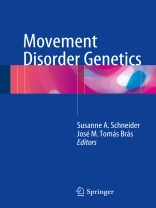This book covers recent developments and possible pitfalls in the diagnosis of genetic movement disorders and related conditions. It is divided into three sections: technical and scientific aspects; clinical aspects with guidance towards work-up; and ethical and legal aspects of genetic testing in a clinical and research setting.
The first section includes chapters on genetic analysis and counselling with critical discussion of potential problems when interpreting the results. Clinical chapters summarize genetic forms of movement disorders including parkinsonism, tics and dystonia with algorithms for hands-on daily practice. Related conditions such as RLS, ataxias and dementias are also covered. Finally, chapters on ethical and legal aspects of genetic testing are included.
Movement Disorder Genetics is aimed at clinicians and scientists working in the field of movement disorders and related conditions.
Tabela de Conteúdo
Genetics of Mendelian Forms of Parkinson’s Disease.- Genetics of Parkinson’s Disease.- Genetics of Atypical Parkinsonism.- Genetics of Dementia with Lewy Bodies.- Genetics of Frontotemporal Dementia.- Genetics of Primary Tremor Disorders.- Genetics of Dystonia.- Genetic Choreas.- Genetics of Tourette Syndrome.- Genetics of Paroxysmal Dyskinesia.- Genetics of Dominant Ataxias.- Genetics of Recessive Ataxias.- Genetics of NBIA Disorders.- Genetics of Metal Disorders (Excluding NBIA).- Genetics of Restless Legs Syndrome (RLS).- Genetics of Hereditary Spastic Paraplegias (HSP).- Genetics of ALS.- Genetics of Mitochondrial Disease with Focus on Movement Disorders.- Introduction to Genetics and Genetic Counseling for Clinicians.- Genetic Testing – An Industrial Perspective.- Direct-to-Consumer DNA Genetic and Genomic Testing.- Current Ethical Issues Related to the Implementation of Whole Exome and Whole Genome Sequencing.- Implications for Health and Life Insurances and Other Legal Aspects of Genetic Testing.
Sobre o autor
Susanne A. Schneider is a consultant neurologist and clinician scientist at the Department of Neurology in Kiel, Germany. She completed her neurology specialty training at the Queen Square Institute of Neurology in London, England and the University of Lübeck, Germany. She has always had a great interest in movement disorders with focus on movement disorder genetics and electrophysiology. She holds a Ph.D. degree in neurosciences from University College London. She has received many awards, among others the European Dystonia Society David Marsden Award and the AAN Jon Stolk Award in Movement Disorders for Young Investigators. She has published more than 120 papers and is one of the four co-authors of Marsden’s Book of Movement Disorders. Selected publications include:
Schneider SA, van de Warrenburg BP, Hughes TD, Davis M, Sweeney M, Wood N, Quinn NP, Bhatia KP. Phenotypic homogeneity of the Huntington disease-like presentation in a SCA17 family. Neurology 2006;67(9):1701-3.
Schneider SA, Walker RH, Bhatia KP. The Huntington’s disease-like syndromes: what to consider in patients with a negative Huntington’s disease gene test. Nat Clin Pract Neurol. 2007;3(9):517-25.
Schneider SA, Djarmati A, Lohmann K, Winkler S, Pawlack H, Hagenah J, Brüggemann N, Zittel S, Fuchs T, Raković A, Schmidt A, Jabusch HC, Wilcox R, Kostić VS, Siebner H, Altenmüller E, Münchau A, Ozelius LJ, Klein C. Mutations in the THAP1 (DYT6) gene- a cause of generalized dystonia with prominent spasmodic dysphonia. Lancet Neurol 2009;8(5):447-52.
Paisan-Ruiz C, Bhatia KP, Li A, Hernandez D, Davis M, Wood NW, Hardy J, Houlden H, Singleton A, Schneider SA. Characterisation of PLA2G6 as a locus for dystonia-parkinsonism. Ann Neurol. 2009;65:19-23.
Bras J, Verloes A, Schneider SA, Mole SE, Guerreiro RJ. Mutation of the parkinsonism gene ATP13A2 causes neuronal ceroid-lipofuscinosis. Hum Mol Genet. 2012;21(12):2646-50
Sheerin UM, Schneider SA, Carr L, Deuschl G, Hopfner F, Stamelou M, Wood NW, Bhatia KP. ALS2 mutations: juvenile amyotrophic lateral sclerosis and generalized dystonia. Neurology 2014;82(12):1065-7.
Bras JM, Guerreiro RJ, Teo JT, Darwent L, Vaughan J, Molloy S, Hardy J, Schneider SA. Atypical parkinsonism-dystonia syndrome caused by a novel DJ1 mutation. Mov Disord Clinical Pract. 2014 (published online)
Donaldson C, Marsden CD, Schneider SA, Bhatia KP. Marsden’s Book of Movement Disorders. Oxford University Press. 2012. ISBN13: 9780192619112ISBN10: 019261911X Hardback, 1552 pages.
José Bras is a molecular geneticist whose research interests are primarily directed at how genetic variability acts on neurodegenerative diseases. He performed his doctoral studies at the NIH under the supervision of Dr. Andrew Singleton and later moved to London, UK to pursue post-doctoral work at the Institute of Neurology, University College of London. Selected publications from Jose’s recent work include:
Bras J, Guerreiro R, Santo GC. Mutant ADA2 in vasculopathies. N Engl J Med. Pub Med PMID: 25075847.
Bras J, Guerreiro R, Darwent L, et al. Genetic analysis implicates APOE, SNCA and suggests lysosomal dysfunction in the etiology of dementia with Lewy bodies. Hum Mol Genet. Pub Med PMID: 24973356
Guerreiro R, Wojtas A, Bras J, et al. TREM2 variants in Alzheimer’s disease. N Engl J Med. Pub Med PMID: 23150934
Bras J, Guerreiro R, Hardy J. Use of next-generation sequencing and other whole-genome strategies to dissect neurological disease. Nat Rev Neurosci. Pub Med PMID: 22714018.
Simón-Sánchez J, Schulte C, Bras JM, et al. Genome-wide association study reveals genetic risk underlying Parkinson’s disease. Nat Genet. Pub Med PMID: 19915575.












